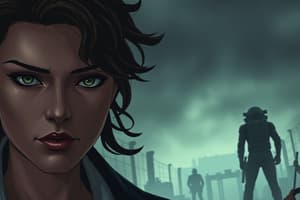Podcast
Questions and Answers
What role does Watson serve in the Sherlock Holmes stories?
What role does Watson serve in the Sherlock Holmes stories?
- He is a minor character with no significant impact.
- He is Sherlock's confidant. (correct)
- He is the main antagonist.
- He is the omniscient narrator.
Which definition best describes an anti-hero?
Which definition best describes an anti-hero?
- A character who opposes the protagonist in every scenario.
- A central character lacking traditional heroic qualities. (correct)
- A character who performs heroic acts for self-gain.
- A character who upholds morality and courage.
What is the primary characteristic of a villain in a story?
What is the primary characteristic of a villain in a story?
- They serve only as comic relief.
- They always have a tragic backstory.
- They are often a hero in disguise.
- They act in direct opposition to the protagonist's goals. (correct)
Which option best describes a minor character?
Which option best describes a minor character?
Who serves as the narrator in 'The Great Gatsby'?
Who serves as the narrator in 'The Great Gatsby'?
Which type of character serves as the main figure around whom the story revolves?
Which type of character serves as the main figure around whom the story revolves?
What role does the antagonist primarily fulfill in a narrative?
What role does the antagonist primarily fulfill in a narrative?
What defines a dynamic character in literature?
What defines a dynamic character in literature?
Which character type contrasts with the protagonist to highlight their qualities?
Which character type contrasts with the protagonist to highlight their qualities?
Which of the following is an example of a round character?
Which of the following is an example of a round character?
What is the primary characteristic of a static character?
What is the primary characteristic of a static character?
Which of the following best defines a stock character?
Which of the following best defines a stock character?
What is the role of a confidant in a story?
What is the role of a confidant in a story?
Flashcards are hidden until you start studying
Study Notes
Character Roles in Literature
-
Protagonist: Central character around whom the story revolves; typically the one the audience supports.
- Examples include Harry Potter and Katniss Everdeen.
-
Antagonist: Opposes the protagonist and creates conflict; can be a character or a force.
- Examples include Lord Voldemort and Darth Vader.
-
Foil: A character whose contrasting traits emphasize certain qualities of the protagonist.
- Example: Draco Malfoy highlights Harry Potter's humility and courage.
-
Dynamic Character: Undergoes significant internal change throughout the story, affecting personality, beliefs, or understanding.
- Example: Ebenezer Scrooge transforms from greed to generosity.
-
Static Character: Remains unchanged throughout the narrative; personality and behavior do not shift.
- Example: Sherlock Holmes typically embodies brilliance and aloofness.
-
Round Character: Well-developed character with complex traits that showcase a range of emotions and motives.
- Example: Elizabeth Bennet displays intelligence, humor, and emotional depth.
-
Flat Character: One-dimensional character defined by one or two traits, serving a specific role in the story.
- Example: Mr. Collins is primarily characterized by his pompous nature.
-
Stock Character: Stereotypical and instantly recognizable figure with predictable behavior and traits.
- Examples include the "wise mentor" like Gandalf or the "evil stepmother" seen in Cinderella.
-
Confidant: Character in whom the protagonist confides, helping them express thoughts and motivations.
- Example: Dr. Watson in Sherlock Holmes.
-
Minor Character: Supports the main story but lacks a significant role; often fulfills specific functions.
- Examples include the shopkeeper in The Lion, the Witch, and the Wardrobe.
-
Anti-Hero: Protagonist lacking traditional heroic qualities, yet still central to the story.
- Examples include Jay Gatsby and Walter White.
-
Villain: Evil character acting as the main antagonist, often opposing the protagonist's goals.
- Examples include The Joker and Sauron.
-
Narrator: Character or voice telling the story, which can be an involved character or an outside observer.
- Example: Nick Carraway in The Great Gatsby serves both as character and narrator.
Studying That Suits You
Use AI to generate personalized quizzes and flashcards to suit your learning preferences.




